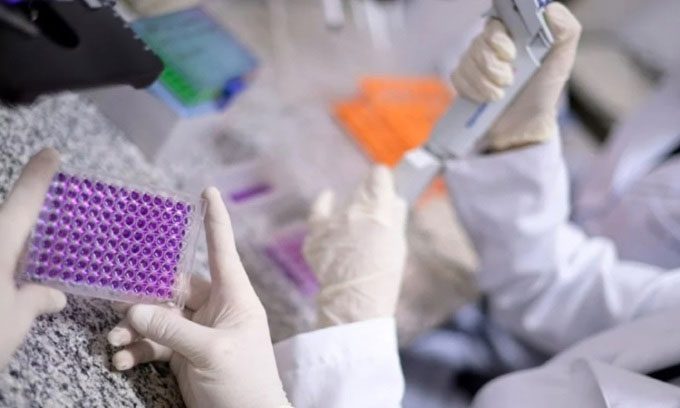Scientists in Brazil have announced the development of an advanced new method to treat stimulant addiction, specifically cocaine and methamphetamine, based on a vaccine.
Named “Calixcoca”, the experimental vaccine triggers an immune response that prevents cocaine and methamphetamine from reaching the brain, helping users break the cycle of addiction. In other words, they will no longer feel the euphoric effects associated with stimulant use. If this treatment method receives approval, it will mark the first time that cocaine addiction is treated with a vaccine, according to psychiatrist Frederico Garcia, coordinator of the vaccine development team at the Federal University of Minas Gerais, as reported by AFP on October 26.

Scientists researching the Calixcoca vaccine. (Photo: AFP).
The vaccine project won a $530,000 award at the Euro Health Innovation competition sponsored by the pharmaceutical company Eurofarma. The vaccine works by stimulating the patient’s immune system to produce antibodies that bind to cocaine molecules in the bloodstream, making them too large to enter the brain’s pleasure pathways, also known as the “reward area.” This is where stimulants typically mimic high levels of dopamine, producing pleasure. Similar research is being conducted in the United States, the world’s leading cocaine consumer, according to the United Nations Office on Drugs and Crime. However, the research has stalled as clinical trials have not yielded the expected results, among other reasons.
So far, Calixcoca has shown effectiveness in animal trials, producing large amounts of antibodies against cocaine with very few side effects. It also protects mouse embryos from cocaine, demonstrating its potential for use in humans to safeguard the unborn child when the mother is addicted. The vaccine is now nearing the final stage of human trials. According to Garcia, Calixcoca could reshape addiction treatment.
Calixcoca may assist patients at critical recovery stages, such as when they leave rehabilitation centers. The vaccine is produced with laboratory-designed chemical compounds rather than biological materials, making its production cost significantly lower than many other vaccines, and it does not require refrigeration.
The exact target population will depend on the results of clinical trials, but theoretically, Calixcoca is suitable for recovering addicts who want to stay away from cocaine. The research team’s goal is to change a troubling statistic. According to the National Institute on Drug Abuse in the U.S., one in four regular cocaine users becomes addicted, and only one in four addicts successfully detoxifies after five years of treatment. Over 3,000 people have contacted the research team to volunteer for clinical trials.



















































